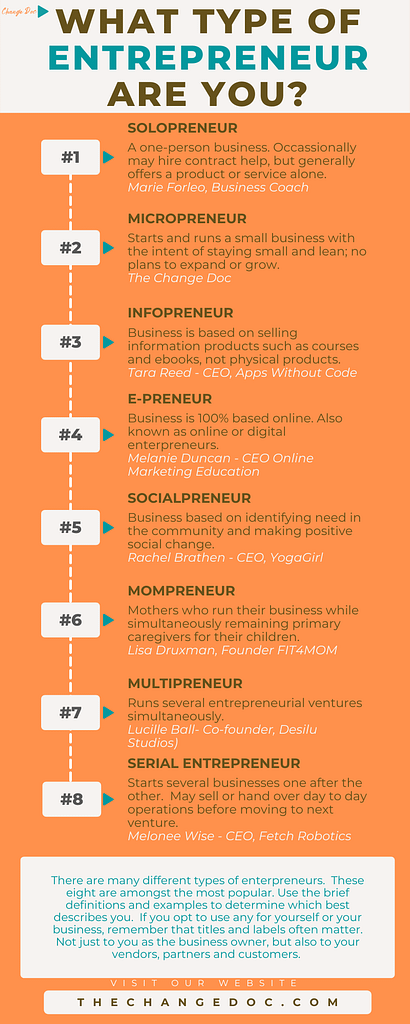As global business has evolved and expanded over centuries, so have the types of entrepreneurs.
Business and educational publications are filled with articles about entrepreneurship despite the lack of agreement on a common definition.
Entrepreneur Definitions.
Here are three prominent entrepreneur definitions:
An entrepreneur is:
- Someone who not only perceives an opportunity but also “creates an organization to pursue it”; originally defined by William Bygrave and reinforced by Harvard Business Review Entrepreneur’s Handbook.
- A person who makes money by starting or running businesses, especially when this involves taking financial risks (Oxford Review Encyclopedia)
- One who organizes, manages and assumes the risks of a business or enterprise (Miriam Webster Dictionary)
Amongst entrepreneurship experts, assuming financial risks and managing the business (versus only making a financial investment) are consistently important to the base definition.
More refined definitions include additional criteria such as innovation and intent to grow.
Related Article: Should I Start A Side Hustle: Three Things to Consider
Three Reasons Entrepreneurs Are So Important.
- Economic development – Entrepreneurs contribute to the world’s economy by expanding new markets, creating jobs and establishing employment opportunities.
- Innovation – History has proven that entrepreneurs create services and products that shift the way people think and behave (ie, Apple, AirBnB). This is truer today than ever before. Because technology has minimized many traditional barriers to entry in a variety of industries, the world is experiencing a surge of viable, innovative ideas.
- Creates change, including social change – Entrepreneurs are constantly pushing the boundaries, thinking outside of the box, and not settling for the status quo. This results in continuous evolution of what, why, and how society operates. In some instances, this has also led to improvements in the quality of life for disadvantaged groups.
Women Entrepreneurs & Key Statistics.
Women are steadily increasing their representation amongst entrepreneurs worldwide.
The reasons for this growth in entrepreneurial ventures span from women wanting to make more of an impact in the world to the reality that entrepreneurship is often the only viable means for some women to earn an income and provide for their families.
Here are a few interesting statistics:
- Globally, there are 252 million women entrepreneurs. (Global Entrepreneurship Monitor)
- 27% of small business owners in the U.S. are women. (Guidant Financial)
- The most popular industries for women-led and women-owned businesses in the U.S. include retail (16%); health, beauty, and fitness services (13%); business services (11%); food and restaurant (10%); and residential and commercial services (7%). (Guidant Financial)
- Between 2014 and 2019, there was a 21% increase in the number of women-owned businesses in the U.S., compared with a 9% increase in the number of all businesses. (American Express)
- There are about 6.4 million businesses in the U.S. owned by women of color, as of 2019. (American Express)
- African American or Black women own 2.7 million businesses in the U.S. (American Express)
- Latina or Hispanic women own 2.3 million businesses in the U.S. (American Express)
Types of Entrepreneurs.
Just like so many other things, there is no single type of entrepreneur.
In fact, despite there not being a common definition, several types of entrepreneurs have emerged as a result of circumstances, experiences, and business situations.
Which type of entrepreneur are you? Let us know in the comments.
But remember, entrepreneurship can be complex so it is quite possible you will resonate with more than one definition or “type”.


